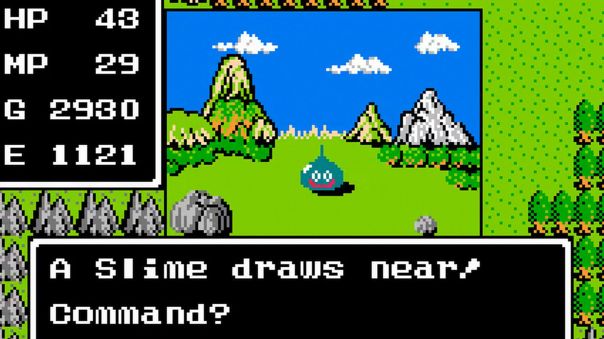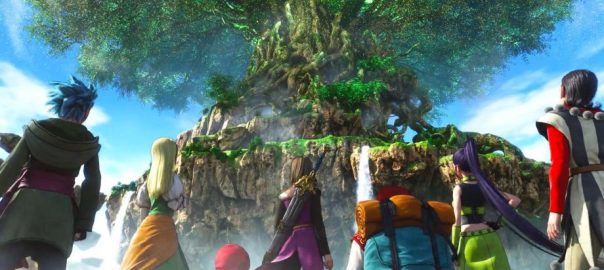In Japan, the Dragon Quest franchise is a bonafide phenomenon. Each instalment sells millions of copies within the first few days of launch. It has retained its audience of both casual and hardcore players across multiple console generations, the first game having been released in 1986 on the NES. In a 2006 Famitsu survey of the best games of all time, readers voted three separate Dragon Quests into the top ten. The iconic Slime character is as ubiquitous in Akihabara as Mickey Mouse, Bart Simpson, or the (sorry, but it’s true) Minions are over here. Yet the series has never reached that huge level of popularity outside of its homeland. For the upcoming Dragon Quest XI, Square Enix want to change that. Will it succeed?
They are going all-out with the localisation for the latest game, not only translating the game and recording English voice acting (including neat touches like “country bumpkin” NPCs having West Country accents), but adding new features not present in the Japanese release. These include a “Hard Mode”, redesigned menus, a quicker dash to allow you to explore the game faster, and a first person perspective presumably designed to capitalise on the Western RPG stylings of the Elder Scrolls and Dragon Age series. So far that localisation process has been trundling on for almost a year. The game was released in Japan on July 29, 2017, with the rest of the world due to get it September 4, 2018.
The last instalment they went to this amount of effort for was Dragon Quest VII, on the PS2, and it paid off. It sold half a million copies in the US, the series’ biggest overseas success at that point. In an interview with Edge, executive producer Yu Miyake told Nathan Brown that “the way it was localised, the translation and the voices…that’s the baseline now, and everything we do for XI is going to be at least of that quality.” From the sounds of it, they’re really pushing the boat out for this release, much as it did for Final Fantasy XV. For all that game’s problems, it has sold well across the globe — over seven million copies at last count.
Historically, Square Enix have not put this much effort into making Dragon Quest catch on in the rest of the world. Which means that, historically, it…hasn’t. When Dragon Quest III was released in Japan, truancy officers picked up over 300 schoolchildren who had ditched class to play the game on launch day, leading to the rumour that the government demanded the developers only ever release further entries on public holidays or weekends. Meanwhile, they didn’t even manage to copyright the Dragon Quest name overseas until 2002, due to a conflict with the tabletop RPG of the same name. The few games that were localised for English-speaking audiences came out under the title Dragon Warrior, were often heavily censored thanks to some religious iconography that appeared, and suffered from the Final Fantasy fate of being released out of order, with certain instalments skipped over or renamed.

Nonetheless, on paper, the franchise’s lack of a foothold outside of Japan is puzzling. Its characters are designed by Akira Toriyama, whose Dragonball lead the first wave of translated manga in America and Europe. The series more-or-less invented the turn-based battle system that’s been a mainstay of almost every JRPG since. Its fantastical setting looks to more Western than Eastern influences, drawing on the likes of Wizardry and Ultima for its world of mages, knights, goblins and ghouls.
There have been some recent moves to make Dragon Quest catch on overseas. In the past couple of years, Square Enix have released localised versions of spin off titles Dragon Quest Builders (which incorporates some Minecraft-esque base building and construction to the classic JRPG formula) and Dragon Quest Heroes II (which replaces the turn-based battles with hack and slash action more akin to a Dynasty Warriors game). Dipping their toes with titles outside the main series was a smart move; Builders posted worldwide sales of 1.1 million.
Accessibility may be an issue when it comes to Dragon Quest XI. It’s already such an well-established property in Japan, it can be intimidating to get on board with. Starting with the eleventh installment in a series can seem an almost insurmountable obstacle, where picking up Builders or Heroes wasn’t. Yet Dragon Quest XI might take a page out of Monster Hunter: World’s book. Like the Square Enix series, Capcom’s fantasy action franchise has had a cult following in the West for a while now, but that’s nothing compared to the enormous success it has had at home. Of the 45 million copies sold worldwide in the series, most of them were in Japan and Asia.
That changed with World. Anybody engaged with English-language gaming culture will have noticed a great deal more coverage for the game, and consequently, a great deal more interest from fans who were previously unfamiliar with the series. You don’t need to rely on anecdotal evidence, either. Since its release in January of this year, the game has sold 7.5 million copies, making it the best-selling game in Capcom’s history. It’s safe to assume a significant amount of those sales came from the localised version of the game, given it has beaten the huge success of titles like Resident Evil and Street Fighter, which have traditionally done very well overseas.
There are further parallels to be drawn between the Dragon Quest and Monster Hunter, besides their nominal generic similarities and country of origin. The consistent popularity of each can, at least partially, be put down to the rigidity of their core gameplay loops. Since the Monster Hunter series began with 2004’s eponymous PS2 entry, it hasn’t strayed far from the crafting gear, killing beasties, rinse and repeat mechanic. Similarly, Dragon Quest has been criticised for refusing to innovate too radically on its initial premise. The difference is that Monster Hunter took 14 years to break through to a worldwide audience, and the Square Enix RPG has been going for over thirty at this point.

Monster Hunter: World did make some concessions to those unfamiliar with the series, but not that many. There’s still an excess of menus cluttering the UI whenever you’re between hunts, and a positive prolix of systems and mechanics running in the background that can be tweaked to your heart’s content. The difference between it and earlier entries is that players can choose how much they want to get involved in the micro-level tinkering, or if they want to keep their eyes on the macro prize. Crafting gear, looting and planning is always going to be part of the gameplay, but spending hours with the prep side of things is no longer a prerequisite as it was for earlier titles.
Another reason for Monster Hunter: World’s near-instant international success is that it was released simultaneously worldwide, across all platforms, barring PC. The hype machine could therefore roar into life and hook a global audience all at once. Dragon Quest XI has already failed to match that. While it has so far shifted three million copies on the PS4 and 3DS in Japan, it came out nearly a year ago. The handheld version will not be getting an English-language release, either. A Switch version is in the works, but has reportedly been delayed until 2019 due to the Nintendo console not supporting the Unreal 4 engine.
Meanwhile, the Final Fantasy XV comparison is not wholly apt, as that’s a franchise which is already well-known among the gaming populace in the rest of the world. That game also ended up giving a somewhat compromised take on what “Western” RPG fans apparently want, a bastard child of Final Fantasy and The Witcher 3. This, too, could prove to be Dragon Quest’s undoing. While it makes some concessions to a global audience, it also offers only the illusion of an open world to explore. In actuality, it consists of a series of gated areas where, Ocarina of Time-style, NPCs stop you from heading into environments you’re not supposed to be at yet.
Capcom knew the right things to tweak to get newbies on board with Monster Hunter, without undercutting what made the series popular in the first place. While Square Enix are aiming for World numbers, a more likely fate may be one similar to that of Persona 5. That game similarly received more vocal attention from the gaming press and fans than previous installments. The complicated, interconnected systems of dungeon crawling, deity-breeding and social links mean that, while it was the fastest-selling title in the series’ history and is undoubtedly impressive for a relatively niche property, it wasn’t quite the killer app Monster Hunter turned out to be and which Dragon Quest is in Japan.
One of the core characteristics of the Dragon Quest series is that aforementioned degree of stasis. The game simply doesn’t change that much between each entry. In Japan, this ensures that anybody can jump back into the franchise at any time. Someone who hasn’t played any of the games since the original NES title in 1986 presumably wouldn’t have a tough time if somebody put Dragon Quest XI in front of them. For a worldwide audience unfamiliar with the series, but well acquainted with the development of the RPG genre over the past thirty years, might find it’s too stuck in the past to have much of a future.
